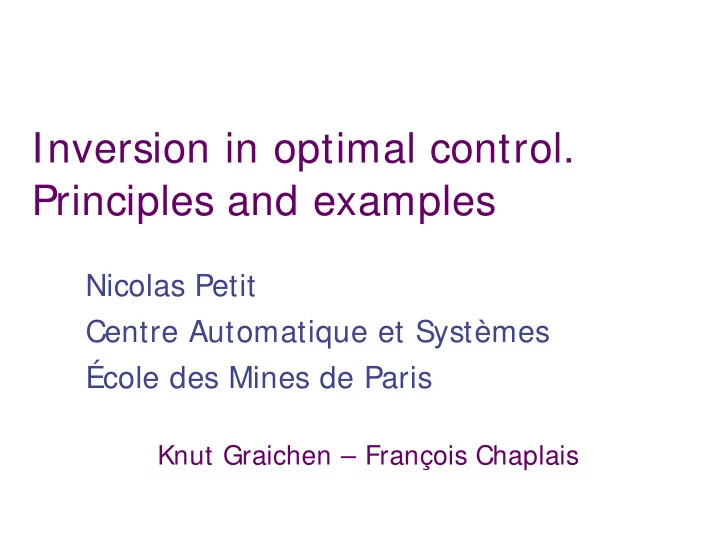

Inversion in optimal control. Principles and examples Nicolas Petit Centre Automatique et Systèmes École des Mines de Paris Knut Graichen – François Chaplais
Outline 1. Receding horizon control (RHC - MPC) 2. Efficient trajectory parameterization 3. Examples 4. Indirect methods Conclusions and future developments
1- Receding Horizon control
Iterating the resolution Bellman’s principle of optimality
In the limit
Lyapunov function
Practical issues
2 – Efficient trajectories parameterization Direct methods: collocation
Collocation (Hargraves-Paris 1987) Dynamic inversion (Seywald 1994) Eliminating the control variable
Eliminating the maximum number of variables (Petit, Milam, Murray, NOLCOS 01 r : relative degree of z1, zero dynamics, normal form, flatness y stands for Instead of
Comparisons (dim x= n, dim u= 1) Full collocation (Hargraves-Paris) : Ο (n+ 1) Dynamic Inversion (Seywald) : Ο (n) (proposed) Inversion : Ο (n+ 1- r) Successive derivatives are required (substitutions) Dedicated software package
Example
• Collocation Software • Easily computed NTG: Mark Milam, Kudah derivatives: B-splines • Analytic gradients Mushambi, • Frontend to NPSOL Richard Murray, CalTech or: Matlab, Optim. Toolbox, Spline toolbox
3 – Three examples � CalTech ducted fan � Missile � Mobile robots
CalTech Ducted Fan (M. Milam) Control variables histories Flat outputs : z1 et z2
Trajectory optimization Minimum time transients « terrain avoidance » « Half-turn »
CalTech Ducted Fan (see M. Milam PhD thesis) open loop closed loop terrain avoidance sequence
Minimum time and terrain avoidance NTG receding horizon (update every 0.1s)
Controls: α c, β c Data: m(t), T(t) Missile
Mobile robots
Mobile robots (Vissière, Petit, Martin, ACC 07)
4 – Indirect methods (Chaplais, Petit, COCV 07)
Solution 1: collocation+ inversion 1 unknown, no differential equation
Solution 2: PMP
Two-point boundary value problem
Solution 3: inversion of the adjoint dynamics
Solution 3 (cont.)
Remarkable points of solution 3 • reduction of CPU time • post-optimal analysis • increased accuracy
Post-optimal analysis
Numerical analysis of higher-order TPBVPs
Second order example (comparisons against exact solution)
General result
Dealing with input/state constraints (Knut Graichen)
Conclusions • Numerous variables can be eliminated from formulations of optimal control problems • Direct or indirect methods • r: relative degree plays a dual role in the adjoint dynamics • Some constrained cases or singular arcs can be treated
Some references Numerical 1. 1. U. M. U. M. Ascher, R. M. M. Ascher, R. M. M. Mattheij, Mattheij, and and R. D. R. D. Russell Russell. solution of boundary value problems for ordinary differential equations . Prentice Hall, Inc., Englewood Cliffs, NJ, 1988. Nonlinear Control Systems . Springer, New York, 2nd 2. 2. A. A. Isidori Isidori. edition, 1989. 3. 3. M. Fliess, J. L é vine, P. M M. Fliess, J. L vine, P. Martin, rtin, and nd P. P. Rouchon Rouchon. Flatness and defect of nonlinear systems: introductory theory and examples. Int. J. Control , 61(6):1327 – 1361, 1995. 4. 4. N. Petit, M. B. N. Petit, M. B. Milam, Milam, and and R. M. Murray . M. Murray. Inversion based constrained trajectory optimization. In 5 th IFAC Symposium on Nonlinear Control Systems , 2001. 5. 5. M. Milam. M. Milam. Real-Time Optimal Trajectory Generation for Constrained Dynamical Systems. . PhD thesis. California Institute of Technology, 2003. 6. 6. K. K. Graichen Graichen. Feedforward Control Design for Finite-Time Transition Problems of Nonlinear Systems with Input and Output Constraints. Doctoral Thesis, Shaker Verlag, 2006. 7. 7. F. F. Chaplais and Chaplais and N. Petit . Petit. Inversion in indirect optimal control of multivariable systems. To appear ESAIM COCV, 2007.
Recommend
More recommend